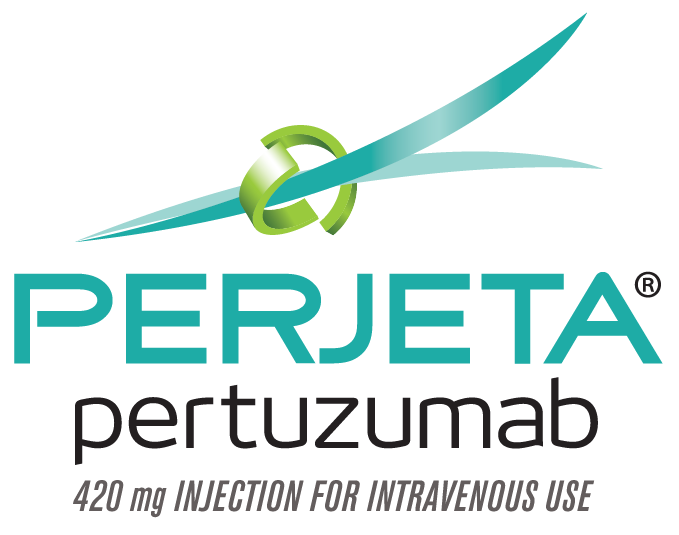
Support & Resources
Indications & Important Safety Information
What does PERJETA treat?
PERJETA® (pertuzumab) is a prescription medicine approved for use in combination with Herceptin® (trastuzumab) and chemotherapy for:
- use prior to surgery (neoadjuvant treatment) in people with HER2-positive, locally advanced, inflammatory, or early stage breast cancer (tumor is greater than 2 cm in diameter or node-positive). PERJETA should be used as part of a complete treatment regimen for early breast cancer.
- use after surgery (adjuvant treatment) in people with HER2-positive early breast cancer that has a high likelihood of coming back.
PERJETA® (pertuzumab) is a prescription medicine approved for use in combination with Herceptin® (trastuzumab) and docetaxel in people who have HER2-positive breast cancer that has spread to different parts of the body (metastatic) and who have not received anti-HER2 therapy or chemotherapy for metastatic breast cancer.
What should I know about side effects with PERJETA?
- Not all people have serious side effects; however, side effects with PERJETA therapy are common. It is important to know what side effects may happen and what symptoms you should watch for
- Your doctor may stop treatment if serious side effects happen. Be sure to contact your healthcare team right away if you have questions or are worried about any side effects
What are the most serious side effects of PERJETA?
PERJETA may cause heart problems, including those without symptoms (such as reduced heart function) and those with symptoms (such as congestive heart failure).
- Your doctor may run tests to monitor your heart function before and during treatment with PERJETA
- Based on test results, your doctor may hold or discontinue treatment with PERJETA
- Contact a health care professional immediately for any of the following: new onset or worsening shortness of breath, cough, swelling of the ankles/legs, swelling of the face, palpitations, weight gain of more than 5 pounds in 24 hours, dizziness or loss of consciousness
Receiving PERJETA during pregnancy can result in the death of an unborn baby and birth defects.
- Birth control should be used while receiving PERJETA and for 7 months after your last dose of PERJETA. If you are a mother who is breastfeeding, you should talk with your doctor about either stopping breastfeeding or stopping PERJETA
- If you think you may be pregnant, you should contact your healthcare provider immediately
- If you are exposed to PERJETA during pregnancy, or become pregnant while receiving PERJETA or within 7 months following the last dose of PERJETA in combination with Herceptin, you are encouraged to report PERJETA exposure to Genentech at 1-888-835-2555
What are other possible serious side effects?
- PERJETA should not be used in patients who are allergic to pertuzumab or to any of the ingredients in PERJETA
- Infusion-related reactions: PERJETA is a medicine that is delivered into a vein through a needle. PERJETA has been associated with infusion-related reactions, some fatal. The most common infusion-related reactions when receiving PERJETA, Herceptin, and docetaxel were feeling tired, abnormal or altered taste, allergic reactions, muscle pain, and vomiting. The most common infusion-related reactions when receiving PERJETA alone were fever, chills, feeling tired, headache, weakness, allergic reactions, and vomiting
- Severe allergic reactions: Some people receiving PERJETA may have severe allergic reactions, called hypersensitivity reactions or anaphylaxis, which may happen quickly and may affect many areas of the body. Severe allergic reactions, some fatal, have been observed in patients treated with PERJETA
What are the most common side effects?
The most common side effects of PERJETA when given with Herceptin and chemotherapy as part of an early breast cancer regimen before surgery are:
- Constipation
- Damage to the nerves (numbness, tingling, pain in hands/feet)
- Diarrhea
- Feeling tired
- Hair loss
- Headache
- Low levels of red blood cells
- Low levels of white blood cells with or without fever
- Low platelet count
- Mouth blisters or sores
- Nausea
- Pain in the muscles
- Vomiting
- Weakness
Side effects may vary based on chemotherapy regimen.
The most common side effects of PERJETA when given with Herceptin and chemotherapy as part of an early breast cancer regimen after surgery are:
- Diarrhea
- Nausea
- Hair Loss
- Feeling tired
- Damage to the nerves (numbness, tingling, pain in hands/feet)
- Vomiting
The most common side effects of PERJETA when given with Herceptin and docetaxel for treatment of breast cancer that has spread to other parts of the body (metastatic) are:
- Diarrhea
- Hair loss
- Low levels of white blood cells with or without fever
- Nausea
- Feeling tired
- Rash
- Damage to the nerves (numbness, tingling, pain in hands/feet)
You are encouraged to report side effects to Genentech and the FDA. You may report side effects to the FDA at 1-800-FDA-1088 or www.fda.gov/medwatch. You may also report side effects to Genentech at 1-888-835-2555.
Talk to a healthcare professional for more information about the benefits and risks of PERJETA.
Please see full Prescribing Information for additional Important Safety Information, including most serious side effects.
If you cannot afford your medication, visit perjeta.com/financial-support for financial assistance information.